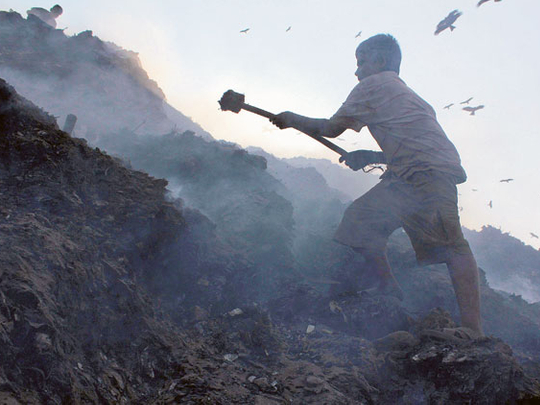
New Delhi: Durga Mukherjee remembers the first time she climbed to the top of New Delhi's largest and oldest landfill, joining the dogs, cows and crows there to begin her life as a waste picker.
"I vomited so much," the 40-year-old mother of four recalled of the pungent smell. "I got there and I thought ‘God, why do I have to do this type of work?' I didn't think I'd ever have to do something like this for a living."
Just a few kilometres from the impressive Akshardham temple, where Indian and foreign tourists flock to see the structure's sandstone and marble work, the 11.73-acre slum-surrounded Ghazipur landfill in east Delhi seems a world apart.
Durga, her husband Saudagar and their four children are among the hundreds of mainly migrant workers who earn a meagre living at the landfill by collecting recyclable material like plastic, metal and even hair to sell.
The dump is the last port of call for Delhi's trash, having already been picked through by other waste collectors who collect bags of garbage directly from homes.
Garbage mountain
The Indian capital is home to three landfills where around 6,000 tonnes of rubbish is dumped daily. The landfills produce significant amounts of methane gas and a black toxic liquid called leachate. Spontaneous combustion causes noxious fumes.
Studies have shown that living near a landfill increases the risk of cancer, birth defects and asthma.
Chintan, an advocacy group, recently said its latest estimate for the total number of people "working in waste" in Ghazipur was more than 1,000.
Every morning, the Mukherjees take the short walk from their two-room shanty home made from plastic sheets to the landfill, where they remain until dark. Children are officially banned from working there, but officials turn a blind eye. Durga's children, the youngest of whom is only nine, work with their parents.
Her sons Dinesh and Nakul are responsible for finding scrap metal. Equipped with buckets and large magnets, they forage through areas covered by small fires that billow smoke out of the gargantuan site and complain about the fumes in their eyes.
For hours of backbreaking work, the family earns just Rs1,000 (Dh68) a week and most of it is spent on food and water.
"It's never enough," Durga said. "Whatever we earn we eat. The children don't go to school. We can't afford to spend 100, 200 rupees because then there'll be nothing left. Books, uniforms cost money."
Still, the landfill offers families like this a steady source of income, and without it they wouldn't survive. Recently, city authorities outlined plans to build a plant near the landfill to process waste into energy.
Chintan estimates that if waste at the landfill was reduced by as little as ten per cent by the plant, families like the Mukherjees would be "severely affected" and would be forced to work longer hours.
Extraordinarily, the Indian government has no large-scale system of garbage removal and recycling and it is undertaken mainly by the informal sector. Even street bins are a rare sight in the Indian capital.
Waste workers play a key role in keeping Delhi clean and save the city government Rs1.5 million every day, according to Chintan. Without them, rubbish would not be collected, sorted or recycled.
Grim toll
However, they remain a marginalised section of society. The Mukherjees are upper-caste Hindus but most of the others belong to religious minorities or lower Hindu castes. Government benefits on offer fail to reach them.
The toxic landscape takes a grim toll. Five-year-old Rani Rai, who used to accompany her mother Partima to the Ghazipur landfill, died earlier this year from a respiratory disease.
"My daughter had an illness but I didn't realise as I was preoccupied with work at the landfill," Partima, 45, said, holding a passport-sized photo of the child. "She died because of the disease she caught here."












